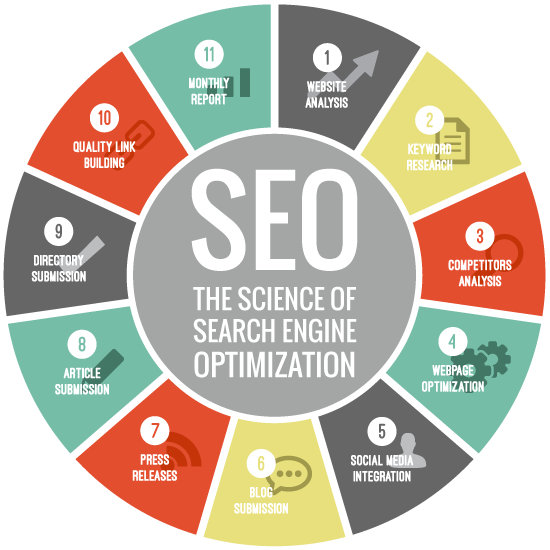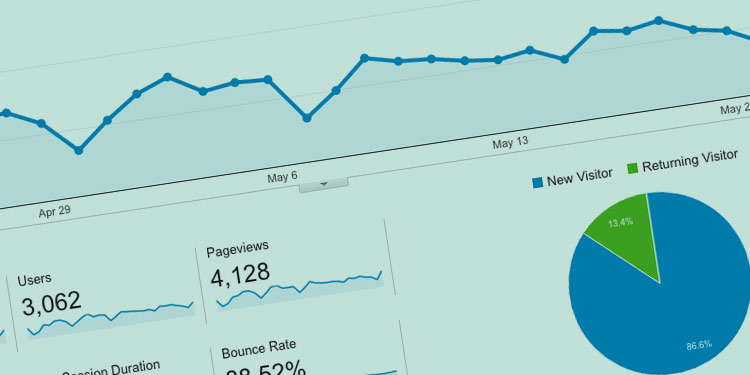SEO: The Science of Search Engine Optimization
SEO is the science of making a web page visible and valuable to search engines
Everyone wants to be on the first page of Google, but not everyone can. In order to rise to the top, you need to know how to get there. An SEO expert will guide you and implement the changes to your website. There is a protocol to the science of search engine optimization.
Think of SEO like a jar of marbles.
Put in one marble for each action you take to make your website more visible to search engines. Take out one marble for any penalties you incur. The more marbles you have in your jar, the better your rank will be.
Read more about why ignoring SEO on your blog is a waste
The Infographic below shows you the 11 main components of Search Engine Optimization.

SEO is not for the faint of heart.
It involves a combination of on-page technical enhancements and off-site factors such as:
- Content quality
- On page content optimization (Titles, Keywords, Htags etc)
- Page structure
- Back end coding
- Keyword research and proper use
- Quality and quantity of links into your site
- Social media shares
- Public relations outreach
- Understanding Analytics
- Bounce rate
- Site speed/load time
- Mobile responsiveness
Things have changed in the 12 years we have been practicing SEO, but many things stay the same.
Search engines still want to deliver the most relevant result when someone searches for information.
How they determine that has changed over the years and is the subject of much theory and testing by SEO gurus.
Content is still the key factor in rankings
Content that educates, informs and entertains is the Holy Grail of Content Marketing, AKA Inbound Marketing. Everyone knows it’s important to blog, but not everyone has the time and talent to do it right. Unless you are a storyteller with SEO skills, armed with a well-researched keyword analysis, you may be wasting your time.
Hire a writer if you want to be consistent, creative and entertaining, and have an SEO expert to work the back end.
On-page Optimization
This means the titles (URLs and Htags) of your pages and posts need to be strategically crafted to your content. The titles, headlines, image alt text and meta descriptions tell search engines what the content is about. Keywords factor in here, but they can’t be robotic.
Lucky for all of us, Google’s algorithm has become more intuitive to nuances in language, which makes writing more natural and eliminates the need to “Keyword Stuff” your content.
How your pages and posts are structured enhances your listings.
“Htags” tell Google what the hierarchy is. The most important information is at the top (H1 tag-usually the page title or blog title), and the sub-headlines (H2, H3, H4) support the content, just like the chapters of a book. Read more about textbook perfect H Tag structure
Back end coding
The code of your site is what search engines read. It looks like this:

Who can read this, and how would you know where to start? It’s enough to cause a migraine.
That’s where the science comes in. There are many things an SEO team can do in the code to help search engines understand where you are located, and how much of an authority you are in your business.
It can include:
- Crafting a proper Htag structure
- Correcting 404 error pages
- Adding Alt Text to images
- Schema markup to emphasize key information
- Page Structure
- URL structure
- Keyword density
- Compressing code to increase speed
Keyword research and proper use

Many people think if you throw a certain keyword into a page or post, that page will come up in a search. That’s sort of true, but you may come up on page 1,487,000. There’s a lot more to it if you want it to come up on page 1.
A thorough keyword analysis reveals several things:
- How many searches are performed on a word or phrase every day
- The competitiveness of the term
- Variations of that term
Having a keyword analysis is a big part of an SEO strategy.
With this information, you can write the headlines and copy, get you ideas of what to write about and how to use them in the proper proportion to show Google what your content is about. To gain any traction on a competitive keyword, you’ll need to build a lot of great content around it. Learn more about our writing services
“The new design and SEO work have increased my business 60–70%. Carmen and Network9 have been tremendous—I would recommend them to any of my business associates.” Dr. D. Mitchell
Acquiring Quality backlinks
Another myth is that outbound links on your own website will help your SEO. Nope, but it does help the website that you link to.
In a search engine world, a link INTO your site from another site means your site has AUTHORITY.
A lot of “Black Hat” SEO has been crafted around this one with websites set up just for the purpose of backlinking, but this technique backfired in a big way.
Google put an end to that practice in the infamous Panda update a few of years ago, which crashed the rank of a few major sites. A good link into your site from social media sharing, public relations, guest blogging or just another website that liked your content matters a great deal. That always brings the objective back to writing quality, sharable content.
Using Analytics for Monthly Reports
 Another amazing science, analytics has leapt to the forefront of marketing.
Another amazing science, analytics has leapt to the forefront of marketing.
Companies hire rocket scientists to analyze all the “Big Data” they can now gather about their customers. Knowing the demographics and buying habits of your buyer persona can go a long way to providing them what they want. Google Analytics is free and is a great place to start.
Sign up through your Google account and install the code they give you into your site’s code. Then, explore what people are actually doing on your site.
Bounce Rate
Bounce rate indicates the percentage of visitors who leave your website after viewing one page. If your bounce rate is 40%, that means 60% of your visitors stay for more than one page. 50% is a pretty low bounce rate. If yours is higher than 60% +, having a look at your content and seeing how you can engage more or have clear calls to action will help improve that.
Site Speed / Load Time
If your site takes more than 3 seconds to load, take a marble out of your jar. No one has the patience for a site they have to wait for. There are several factors that be adjusted such to improve load time such as:
- reducing the size of images
- compressing your code
- checking server speed
Mobile Responsiveness
If your website is not optimized and mobile friendly, take another marble out of the jar. A big one. The use of mobile has tipped the scale at about 60% mobile/40% desktop. Rebuild your site in a responsive fluid layout or risk clickoffs. This is not optional.
Not only will phone and tablet users be annoyed with you, but you will also look a business from the Flintstones in the Jetson’s age.
Read more about mobile friendly websites and why Responsive Website Design is no longer an option
SEO Audits
A professional SEO audit will give you crucial insight into your site architecture, content quality, keyword rankings, competitors, broken links and much more. In an audit, a professional can identify how your website can be improved for SEO, and craft a strategy that works with your budget.
If you want to compete in the search engines, your website needs the guidance of an SEO expert. We know which marbles to put in your jar.
Ready to get the answers you need? Our expert SEO team will audit your site and send you an actionable report you can use as a roadmap to improve your site and rankings. We’ll handle the implementation too. Done and done.





